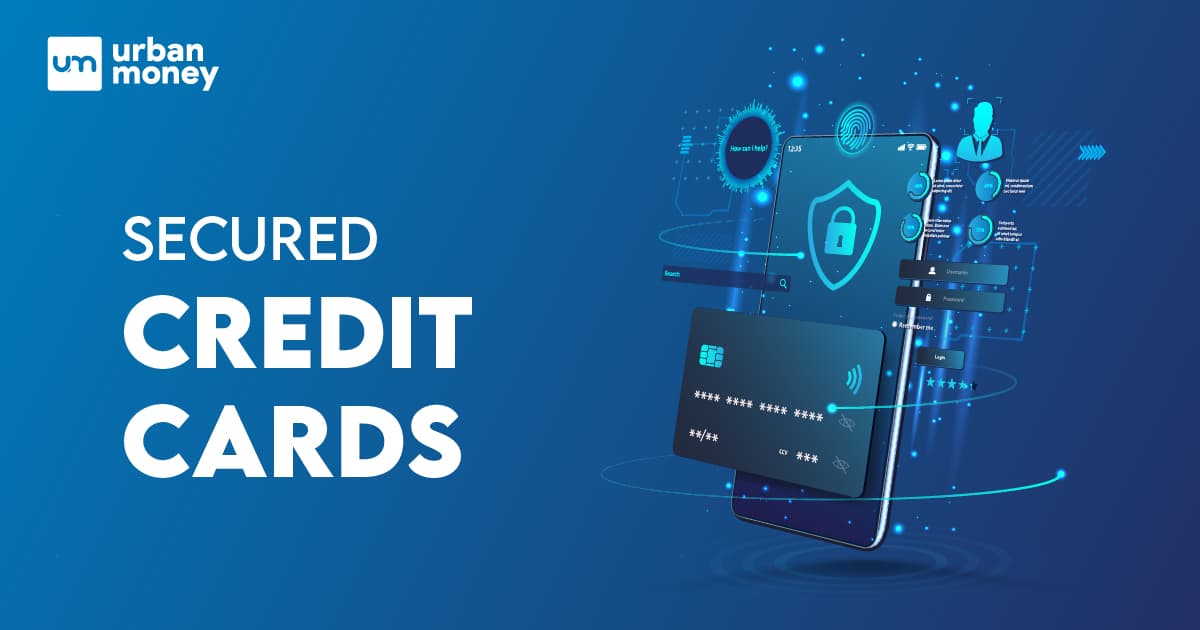- Home
- Credit Card
- Secured Credit Card
What Is a Secured Credit Card? How It Works

- Personalized solutions
- Expert guidance
- Application assistance
- Credit score discussion
- Interest rate comparison


Last Updated: 22 February 2026
Traditionally, credit cards are offered to candidates who have a credit score of around 700 or higher. However, not everyone is able to maintain that score. If you’re someone whose ineligibility robs them of the chance to possess a credit card, secured credit cards are the right solution for you.
A secured credit card requires the borrower to submit a cash deposit as collateral against the card. The credit limit of a secured card, thus, is defined by the deposit amount. These are also referred to as ‘Deposit Backed’ or ‘Cash Backed’ credit cards. Secured credit cards act as stepping stones to improved credit ratings for candidates with subpar credit scores.
Now, you can make online or in-store purchases, book movie tickets or travel around the world without worrying about your financial ratings. Go from good to great using secured credit cards.
How Does a Secured Credit Card Work?
The best way to describe the functioning of a secured credit card is that it Works like a debit card, and rewards like a credit card. Purchases made using secured credit cards are deducted from the deposited amount. At the end of a billing period, the banks ask the cardholder to pay the outstanding amount to maintain the deposit at the specified levels.
Credit cards, being the prime form of plastic money, allow individuals with a robust credit score to pay for present expenses in the future. Here enter secured credit cards, to extend the same advantage to low-rated bank customers. A secured credit card creates a win-win situation for all. For borrowers, it provides a chance to raise their credibility while reassuring the lender with a guarantee in the form of a deposit.
Bill payments function for secured and unsecured credit cards alike. The cardholder is required to repay the outstanding amount, either in full or a minimum specific value, within the prescribed grace period. While no additional interest is charged by banks on repayments made in full within the set dates, outstanding payments will be carried forward with interest and penalty charges levied on them. Banks also have the authority to forfeit the deposit amount in case of defaults. On the brighter side, cardholders making regular settlements while showcasing positive financial behaviour can get a credit line extension.
List of Secured Credit Cards by Banks
Choose the best option for you using the comparative security credit card guide given below.
| Bank | Minimum Deposit (in Rs.) | Maximum Withdrawal Limit | Annual Fees
(in Rs.) |
Key Features |
| IDFC First WOW Credit Card | 2,000-5,000 | 100% of FD value | Free for life | – Interest returns @7.5%
– Personal accident cover worth Rs.2,00,000 – Zero forex markup fee – 100% cash withdrawals |
| Kotak 811 Dream Different Credit Card | 5,000 | 90% of FD value | Free for life | – Railway + Fuel surcharge waiver
– Upto Rs 50,000 card insurance cover – No hidden costs – Reward of Rs 0.25 for 1 point |
| SBI Card Unnati | 25,000 | As per T&Cs | 499 (waived off for first 4 years) | – Zero card fee for the first 4 years
– Cashback – Easy withdrawals – Contactless card services |
| Axis Bank Insta Easy Credit Card | As per T&Cs | 80% of FD | 3,000 | – 100% withdrawal
– 50 days free credit – Guaranteed approval – 15% off with the bank’s dining partners |
| Bank of Baroda Prime Credit Card | 15,000 | As per T&Cs | Free for life | – 50 days of interest-free credit
– Easy EMI services – Cashback and reward points – Fuel surcharge waiver |
Benefits of Secured Credit Cards
- Upgrade to unsecured cards: Optimum usage and timely repayment of card bills raise a secure credit card holder’s creditworthiness. With improved ratings, the same cardholder can upgrade to regular-unsecured credit cards just within a year.
- Easy approval: Banks do not need a guarantee of solid credit ratings while issuing deposit-backed credit cards. Hence, with relaxed verification and documentation procedures, secured credit cards are readily available.
- Returns on fixed deposit: Some banks issue credit cards against a fixed deposit account. The fixed deposit not only fulfils the collateral requirements but also offers regular returns in the form of interest. The maximum credit limit can go upto 100% of the FD amount.
- First-time applicants: If you’ve just got your first job, or have just begun tasting the delight of financial freedom, you can still flaunt a credit card using this product. A secure credit card can be easily issued to anyone capable of making the required deposits.
- Standard credit cards: Cash-backed credit cards offer several advantages of a standard credit card to a cardholder. Facilities like zero forex markups, online/in-store usage, ATM withdrawals and special rewards can be availed by secured and unsecured credit card holders alike.
- Plastic money: Secured credit cards ensure that everyone avails of the benefits of plastic money. The hassle of carrying physical cash is replaced with paperless, convenient and mobile payment options with the help of secured credit cards.
- Digital management: Like every other banking product today, a secured credit card can also be managed digitally using a bank’s mobile application. You can monitor your card’s usage, make monthly repayments, and block your card at the touch of your fingers.
Eligibility of Secured Credit Card
Secured credit cards are offered specifically to candidates with average CIBIL scores. First-time applicants with zero credit history or applicants with poor past records can apply for a secured credit card. Listed below is the eligibility criteria applicable to secured credit cards.
- Age: above 18 years
- Citizenship: Indian
- Residential status: Resident Indian/ NRI
- Annual income: 6,00,000 or more
- A fixed deposit account with the bank
The following card seekers can easily apply for a secured credit card with any leading lender:
- Students
- Housewives
- Low-salaried employees
- First-time employees
- Self-employed applicants with low earnings
- Retired individuals
How to Apply for a Secured Credit Card?
Secured credit cards are issued against cash or fixed deposits. The simple application process makes credit cards immediately available. They can be availed at minimum annual costs while offering upto 50 days of grace period.
The minimum deposit amount to obtain a secured credit card generally ranges from Rs.15,000-20,000 with up to a 100% credit limit. Secured credit cards are issued within 7-10 working days of application and can be used right away.
Offline Application
Secured credit cards can be applied through offline applications at local bank branches. Upon discussing the deposit options with the bank agents and submitting the application, one can readily avail of a secured credit card.
Online Application
Popular secured credit card options can be availed online following these basic steps.
- Visit a bank’s website.
- Under the credit card section, fill in your details like Aadhar number, mobile and OTP number.
- Select from the available credit card options and click on Apply Now.
- Make adequate deposits with the bank.
- Submit the application after providing the remaining information.
An applicant will be shortly contacted by the bank once the application is submitted. Post approval, a secured credit card will be swiftly issued to the applicant.
How Does a Secured Credit Card Differ From an Unsecured Credit Card?
The two types of credit cards can be differentiated in a number of ways. Some of the striking differences are listed below.
- Secured credit cards demand collateral payments while unsecured credit cards are issued only against the borrower’s credit ratings. Therefore, secured credit cards pose higher risks for borrowers while unsecured credit cards pose greater risks for lenders.
- The primary objective of secured credit cards is to help a customer build their financial credibility. However, unsecured credit cards aim to facilitate credit-based cashless transactions by offering attractive rewards and offers.
- A secured credit card’s limit is set against the deposit amount while an unsecured credit card’s limit is pre-defined by the lender on the basis of a borrower’s credit history, repayment capacity and financial stability.
What Is the Purpose of a Secured Credit Card?
Secured credit cards aim to extend credit card facilities to customers with poor credit history. They can assist an individual in building or improving their ‘creditworthiness’ to seek better lines of credit in future.
Can a Secured Credit Card Assist In Improving My Credit Score?
So, we’ve been saying right from the start that secured credit cards mean secured credit scores. But how does that work out? What are the right measures, using which, you can actually climb the credit rating ladder?
Credit cards are widely considered by financial experts as the best way to solidify one’s credit ratings. Along with responsible usage, secure credit cardholders’ ratings can improve within a short span of 6 months. Check out the various ways in which a secured credit can holder can ensure consistent growth of their credit ratings.
Timely Payments
Regularly paying your credit card bills on time is a sure-shot way to success! Payments in full can complement your rise like nothing else. It is estimated that punctual settlements contribute upto 35% to the total credit ratings. So the next time you get your bill, make sure to promptly repay it within the specified time. And keep that a non-negotiable!
Usage Patterns
There is something called a debt-to-credit ratio. Simply put, it is the ratio of the outstanding amount in your credit card account to the maximum credit limit offered to you. As a general guideline, banks suggest their cardholders spend not more than 30% of the card limit at one point in time. Ensuring ideal debt utilisation and avoiding over-expenditure can establish the reliability of a borrower.
Make Regular Purchases
While it is essential to keep an eye on how you use your credit, it is equally important to keep your secured credit card active. Making efficient purchases, whether small or large, to get the attention of credit bureaus can go a long way. Regular card usage increases your chances of earning rewarding add-on benefits.
FAQ About Secured Credit Card
What is a secured credit card in India?
A secured credit card is a type of credit card which is issued to poorly rated borrowers against a cash/fixed deposit.
Does HDFC provide secured credit cards?
HDFC offers credit cards secured against fixed deposits to candidates with subpar credit scores. The maximum card limit is also determined by the FD amount deposited by the applicant.
Can I get EMI on a secured credit card?
Yes, purchases above a set amount can be converted into EMIs using secured credit cards.
What is the maximum limit on a secured credit card?
The maximum limit changes from bank to bank and can vary from 80%-100% of the deposit amount.
What is the limit on a secured card?
A secured credit card’s limit refers to the maximum amount of purchases which can be made using the card. The limit of a secured credit card is determined by the deposit value against which it is issued.
How long should I keep a secured credit card?
A credit card should be used for a minimum of 6 months to one year. Responsible cardholders should first improve their credit ratings using the secured credit card and then gradually move on to other lines of credit.
What happens after 1 year of a secured credit card?
If used properly and repaid timely, a secured credit card holder can improve their credit ratings within 6 months to 1 year and be eligible for other lines of credit.
What are the disadvantages of a secured credit card?
Collateral deposits and low credit limits are among the major drawbacks of a secured credit card.
Can I convert my secured credit card to an unsecured one?
Yes, upon improving one’s credit scores with the help of secured credit cards, one can subsequently be eligible for unsecured credit cards.
